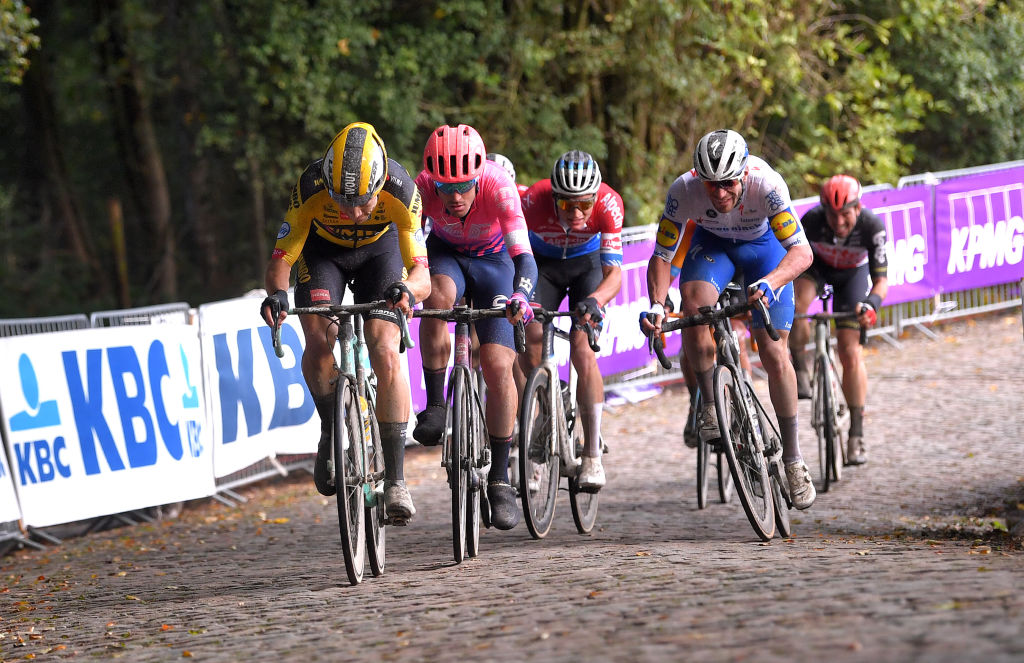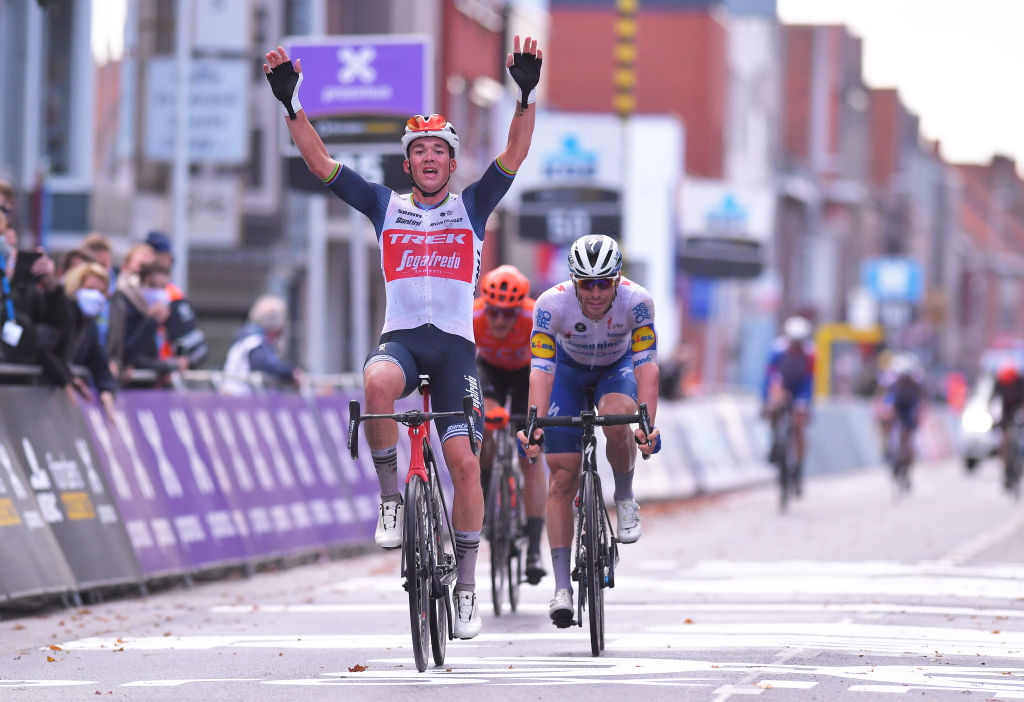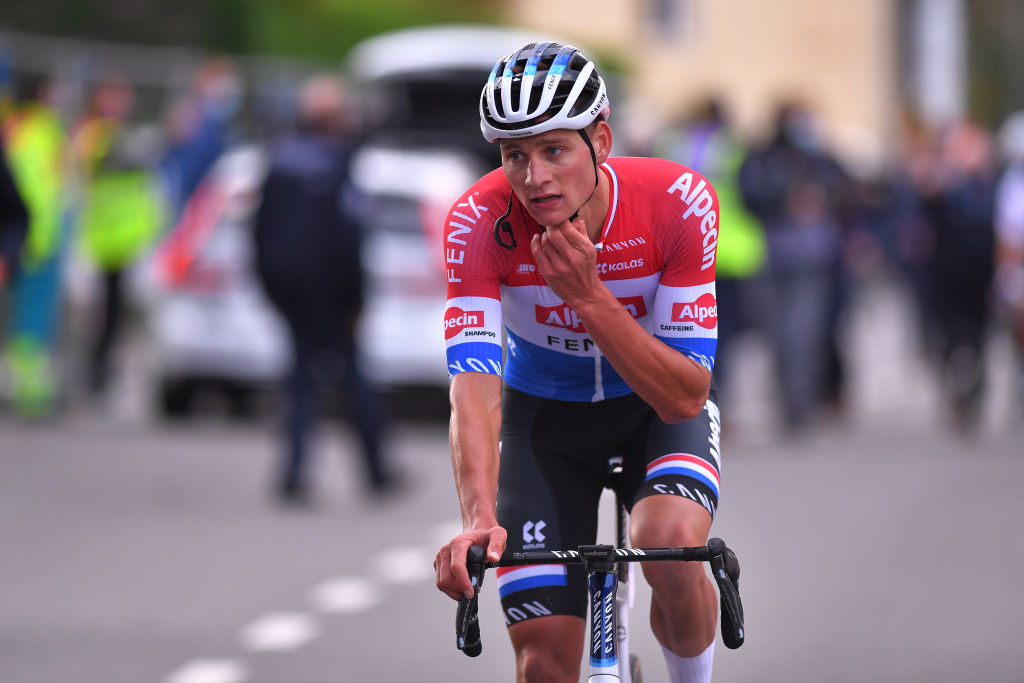5 conclusions from the men's Gent-Wevelgem
Cavendish's emotional hint at retirement, Van Aert versus Van der Poel, Mads world and Deceuninck’s strength in numbers

In this hectic rescheduled season, the Classics are mixed in with the Giro d’Italia, offering daily racing of the highest calibre and a never-ending narrative and flow of news.
Next Sunday’s Tour of Flanders is the big one in Belgium, but this year’s Gent-Wevelgem proved to be far more than just a sideshow, offering some superb racing between the biggest and best Classics riders in the peloton. It also inspired lots of debate and emotion.
Mark Cavendish’s admission that it could have been his last race highlighted the emotions created by an impending retirement and recalled memories of the Manxman’s incredible career.
After years of simmering rivalry coated with respect, the Van Aert versus Van der Poel battle finally exploded in the finale of Gent-Wevelgem, with the Belgian accusing the Dutchman of riding to make him lose rather than trying to win himself.
The spat has created the perfect build-up to next Sunday’s Tour of Flanders, when the two will again go head to head. Gent-Wevelgem winner Mads Pedersen and everyone else in the peloton will no doubt try to take advantage and win the biggest Classic of the COVID-19 season.
Mads World
In his post-race press conference, a delighted Mads Pedersen (Trek-Segaferdo) described how a proportion of his motivation stemmed from proving to the world that he wasn’t a one-hit wonder. His performance in Gent-Wevelgem demonstrated both his class on the bike, as well as his growing maturity.
Simply put, this was a sumptuous ride from the 24 year old, who combined brains with brawn before dispatching his final rivals in the sprint finish.
The latest race content, interviews, features, reviews and expert buying guides, direct to your inbox!
Until that point, Pedersen had saved vital energy and only came to the front to take the minimum number of turns after the main break formed. Of course, he had a ready-made excuse in that, unlike several other rivals, he had no teammates alongside him, but he still needed to follow the right wheels and ensure that he didn’t indulge himself with any of the long-range attacks we saw after the final ascent of the Kemmelberg.
When Wout Van Aert (Jumbo-Visma) and Mathieu Van der Poel (Alpecin-Fenix) decided to mark each other out of the race, Pedersen saw his opportunity but needed to display incredible patience. Inside the final 5km, he kept out of the wind until the last possible moment and with 1.1km to go joined Florian Sénéchal, Alberto Bettiol and Matteo Trentin.
The sprint was almost a formality once the Dane opened up for the line, and while the win in Harrogate last year was something of a surprise, there should be no doubt that Pedersen is a Classics star and a rider who has embraced everything that has been thrown at him this year.
He could have let his head drop after seeing his spring in the rainbow jersey ruined but he was a key component in Richie Porte’s podium in the Tour de France, came close to winning two stages himself, and now has a Gent-Wevelgem title to his name.
This 'one-hit wonder' has plenty more hits to come.

Is this the end for Mark Cavendish?
Riders, no matter their greatness or their palmarès, rarely get to decide on how they leave the sport. The great Miguel Induráin, for example, quietly and without fanfare disappeared from the Vuelta a España in late 1996, and never raced again. Injuries, diminishing powers, or simply a lack of opportunities often dictate how once-great champions leave their sporting arena. Even at the peak of athletes' powers, they can never make time stand still.
On Sunday, the cycling world watched on as, for a brief moment, Mark Cavendish opened up about his situation. He didn’t have to say much, and the moment was defining enough for what wasn’t said and the clear emotion that was pouring from both his voice and body language. It made for difficult viewing and even those not enamored with his style or personality would have understood and empathized with what the 35-year-old Bahrain McLaren rider was going through.
If this truly is the end of the road for Cavendish, then it would mark the final chapter in a career that no other sprinter has come close to matching.
It’s not just the races that Cavendish won or the sheer volume of his back catalogue, but the fact that no other sprinter has left such a mark on his discipline as the Manxman.
Mario Cipollini was quick in a sprint and his Saeco train of the 1990s was dominant, but Cavendish at his best took sprinting into a whole new stratosphere.
For a generation of fans, he normalized the winning of multiple stages in a single Grand Tour, while some of those wins, principally between 2008-2011, were simply breathtaking. There was the World Championship sprint in Copenhagen in 2011, the 2009 Milan-San Remo sprint, and then his resurrection in 2016 – which often doesn’t get the credit it deserves. It was his sheer dominance within his discipline that lifted him above his peers.
However, despite his achievements, it’s clear that Cavendish cannot reach those dizzy heights again. There's no disgrace in that, none of the modern-day sprinters can come close to what he has achieved.
Sadly for Cavendish, the Epstein Barr virus wrecked the final years of his career. Now it’s been too long, the competition is too good – again partly because he set the bar so high – and at 35, time is not on his side.
Maybe there’s a role for him in another capacity. Maybe he wants to take stock and move in a different direction. Whatever the outcome, Cavendish deserves to be the one that decides on what comes next.
Van Aert vs Van der Poel
In the end, the only one to benefit from Van Aert’s and Van der Poel’s rivalry was Mads Pedersen, who gleefully watched on as two of the strongest riders in the race decided to battle each other and not the race.
But as the Van Aert versus Van der Poel debate rumbles on and provides a simmering backdrop ahead of the Tour of Flanders, it became quickly apparent that neither rider will win a spat plated out in the press or even Sunday's Monument if they allow their Gent-Wevelgem tactics to overshadow their next performance.
The Tour of Flanders will have a deeper field and little room for animosity. If Van Aert and Van der Poel want to have genuine chances of winning, they must quickly separate themselves from the mistakes they made and their inflammatory post-race comments.
If they fail to do so, Pedersen, or another rider just as capable, will make them pay for the second time in less than a week.

Deceuninck-QuickStep’s strength in depth
Despite missing world champion Julian Alaphilippe and the talents of Bob Jungels, the Belgian team still managed to post three riders in the main group that decided Gent-Wevelgem.
That number would later shrink to two, but despite not having riders who could aggressively assert themselves on the race, Patrick Lefevere will still see Florian Sénéchal’s second place and three riders inside the top 10 as relative success.
It also means that his team are ready and primed for the Tour of Flanders, where Alaphilippe might be making his debut but will nevertheless start as a favourite.
The Frenchman could end up playing the perfect foil for a Sénéchal or a Kasper Asgreen – second last year – but as we have seen so many times in the Classics it’s strength in numbers that’s often the deciding factor. And yet again, Deceuninck-QuickStep have them.
Trentin blunted
One of the many disappointing aspects of this season is that Classics fans never truly had the chance to see Greg Van Avermaet and Matteo Trentin take on the Spring campaign together at the CCC Team.
There were some promising hints of what could have been in the opening weekend, while at the Tour de France they split potential stage opportunities between them. With Van Avermaet injured and both riders going their separate ways at the end of the year, the brief affair is over.
On Sunday, Trentin flew the flag admirably for CCC Team. He made several attacks, chased when required, but ultimately came up short in a sprint against his nemesis Mads Pedersen.
A few years ago Trentin would have been able to count on his rapid finish as one of his main assets, but in recent times that top-end speed has been lacking.
He’s still fast, there’s no doubt about that, and perhaps he was hampered in Gent-Wevelgem by how he took on the race with an aggressive, lone stance in the absence of Van Avermaet at his side.
Next season, Trentin should find far greater support at UAE Team Emirates, where he can race alongside Alexander Kristoff. Both riders have plenty of similarities but have the potential to complement each other if they race with a united front.
Daniel Benson was the Editor in Chief at Cyclingnews.com between 2008 and 2022. Based in the UK, he joined the Cyclingnews team in 2008 as the site's first UK-based Managing Editor. In that time, he reported on over a dozen editions of the Tour de France, several World Championships, the Tour Down Under, Spring Classics, and the London 2012 Olympic Games. With the help of the excellent editorial team, he ran the coverage on Cyclingnews and has interviewed leading figures in the sport including UCI Presidents and Tour de France winners.
